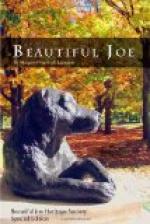Mrs. Wood said that there was never a sermon preached in Riverdale that had the effect that the death of this wicked man had, and it reminded her of a verse in the Bible: “He made a pit and he digged it, and is fallen into the ditch which he made.” Mrs. Wood said that her husband had written about the finding of Mr. Barron’s body to his English relatives, and had received a letter from them in which they seemed relieved to hear that he was dead. They thanked Mr. Wood for his plain speaking in telling them of their relative’s misdeeds, and said that from all they knew of Mr. Barron’s past conduct, his influence would be for evil and not for good, in any place that he choose to live in. They were having their money sent from Boston to Mr. Wood, and they wished him to expend it in the way he thought best fitted to counteract the evil effects of their namesake’s doings in Riverdale.
When this money came, it amounted to some hundreds of dollars. Mr. Wood would have nothing to do with it. He handed it over to the Band of Mercy, and they formed what they called the “Barron Fund,” which they drew upon when they wanted money for buying and circulating humane literature. Mrs. Wood said that the fund was being added to, and the children were sending all over the State leaflets and little books which preached the gospel of kindness to God’s lower creation. A stranger picking one of them up, and seeing the name of the wicked Englishman printed on the title-page, would think that he was a friend and benefactor to the Riverdale people—the very opposite of what he gloried in being.
* * * * *
CHAPTER XXIX
A TALK ABOUT SHEEP
Miss Laura was very much interested in the sheep on Dingley Farm. There was a flock in the orchard near the house that she often went to see. She always carried roots and vegetables to them, turnips particularly, for they were very fond of them; but they would not come to her to get them, for they did not know her voice. They only lifted their heads and stared at her when she called them. But when they heard Mr. Wood’s voice, they ran to the fence, bleating with pleasure, and trying to push their noses through to get the carrot or turnip, or whatever he was handing to them. He called them his little Southdowns, and he said he loved his sheep, for they were the most gentle and inoffensive creatures that he had on his farm.
One day when he came into the kitchen inquiring for salt, Miss Laura said: “Is it for the sheep?”
“Yes,” he replied; “I am going up to the woods pasture to examine my Shropshires.”
“You would like to go too, Laura,” said Mrs. Wood. “Take your hands right away from that cake. I’ll finish frosting it for you. Run along and get your broad-brimmed hat. It’s very hot.”
Miss Laura danced out into the hall and back again, and soon we were walking up, back of the house, along a path that led us through the fields to the pasture. “What are you going to do, uncle?” she said; “and what are those funny things in your hands?”




